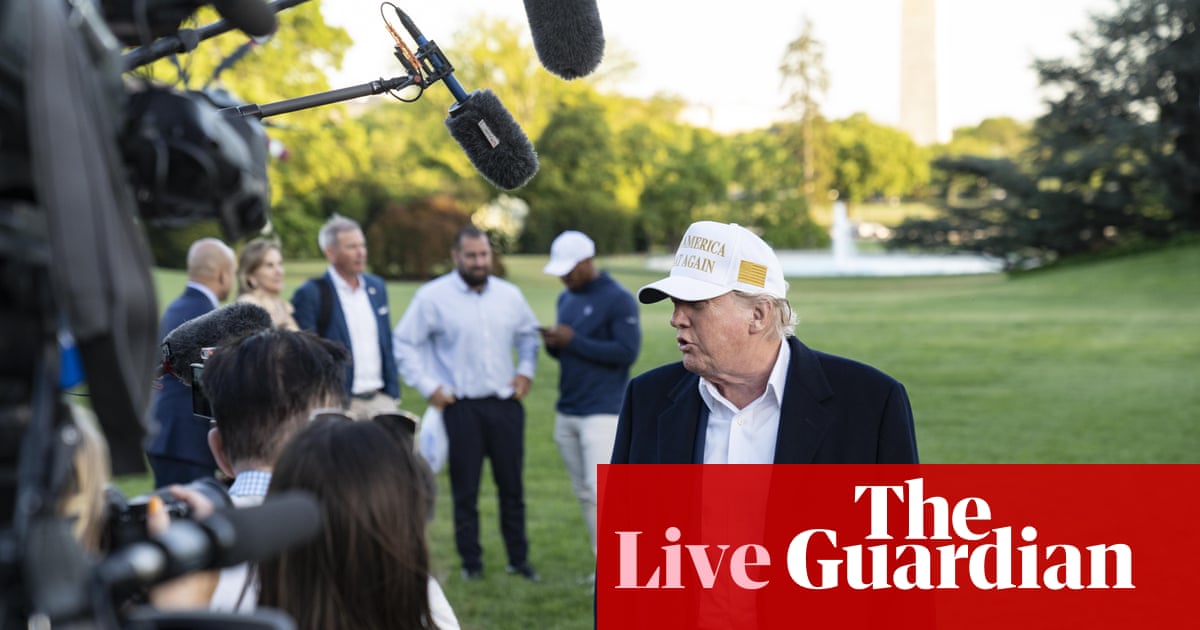Trump to sign executive orders stepping up crackdown on sanctuary states and cities
Trump will sign executive orders law and order, and another on sanctuary cities, Leavitt announces.
The first will “strengthen and unleash America’s law enforcement to pursue criminals and protect citizens”, she says.
The second is “centered around protecting American communities from criminal aliens, and it will direct the attorney general and secretary of homeland security to publish a list of state and local jurisdictions that have shucked the enforcement of federal immigration laws”.
These executive orders will bring the number signed by Trump so far this presidency to more than 140 in 100 days, approaching the number signed by Joe Biden’s entire term, Leavitt notes.
Key events
Another interesting tidbit from The Atlantic’s interview (paywall) with Trump is that some of his advisers have learned to operate by an unofficial rule: They make sure to do things after he says them twice. This is necessary and important because, as one adviser explained, “he says a lot of shit”.
That is what happened when it came to the Kennedy Center, the magazine notes. As planning for Trump’s second inauguration got under way, someone mentioned the possibility of holding an event there, impelling Trump to muse aloud about naming himself chairman of the Kennedy Center, a position that had long been held by David Rubenstein. Trump said: “Call David Rubenstein and tell him he’s fired.” But, sticking to the rule, it was only the second time Trump mentioned wanting to take over the center that his aides got to work, and in early February, Trump fired most of the board and named himself chairman.
Kamala Harris is expected to deliver a sharp critique of the Trump administration during a keynote address on Wednesday, as the president marks his 100th day in office this week.
The former vice-president will deliver her remarks in San Francisco at the 20th anniversary gala for Emerge America, a group that recruits and trains Democratic women to run for office. In her speech, Harris is expected to ask Americans to stand up in response to the Trump administration’s economic policies and power grabs. She is expected to encourage Americans to continue to dissent, finding resilience in collective action.
Wednesday’s speech will be Harris’s most extensive public remarks since losing the election and leaving office, according to her team.
As Democrats search for leadership and a path forward, Harris has largely avoided the spotlight. But earlier this month she delivered some of her most forceful comments since Trump’s November victory.
Speaking at a national conference of Black Women in California earlier this month, Harris decried Trump’s actions and observed that a “sense of fear that is taking hold in our country” but did not mention Trump by name. She also warned against “capitulating to clearly unconstitutional threats” – a pointed remark days after her husband’s law firm, Willkie Farr & Gallagher, struck a deal with the administration to avert penalties by the US government.
Harris is weighing her political future, possibly deciding whether to run for president again in 2028 or join the sprawling 2026 campaign to be California’s next governor.
To understand how Trump rose from the political dead after his 2020 election loss, and how he set himself up to wield power in his second term – namely by removing the human guardrails of his first term that checked his worst impulses and building a loyal team in Maga’s image – The Atlantic (paywall) spoke with dozens of top advisers, senior aides, allies, adversaries, and confidants, many on condition of anonymity.
The story they told us revealed that Trump’s time in the political wilderness is crucial to understanding the way he’s exercising power now.
The formula for staffing the administration wasn’t hard this time: ‘Don’t hire anyone who wasn’t committed to the agenda last time.’
Many of the things that, in his first term, Trump had floated as provocations or trollings or idle musings are now things the president realizes he can actually do. ‘These are all doable,’ Steve Bannon told us. ‘When you’ve come back from such long odds, you clearly feel, “I can do anything”.’
In his first term, Trump and his team had not done certain things – fired key bureaucrats, upended certain alliances, overhauled various initiatives – because, as one former adviser told us, ‘we thought they were red-hot.
‘And then you touch it,’ the former adviser continued, ‘and you realize it’s actually not that hot.’ This may be the key insight of Trump’s second term. The first time around, aides were constantly warning him that the stove was too hot. This time, no one is even telling him not to touch the stove.
Trump’s justice department appointees remove leadership of voting unit

Sam Levine
Donald Trump’s appointees at the Department of Justice have removed all of the senior civil servants working as managers in the department’s voting section and directed attorneys to dismiss all active cases, according to people familiar with the matter, part of a broader attack on the department’s civil rights division.
The moves come less than a month after Trump ally Harmeet Dhillon was confirmed to lead the civil rights division, created in 1958 and referred to as the “crown jewel” of the justice department. In an unusual move, Dhillon sent out new “mission statements” to the department’s sections that made it clear the civil rights division was shifting its focus from protecting the civil rights of marginalized people to supporting Trump’s priorities.
Tamar Hagler, the chief of the voting section, which is responsible for enforcing federal laws designed to prevent voter discrimination, and five top career managers were all reassigned last week to the complaint adjudication office, a little-known part of the department that handles employee complaints, according to people familiar with the matter. A career line attorney in the section has also been reassigned to the complaint adjudication office.
The voting section had seven managers in January overseeing around 30 attorneys. Of the two other managers, one retired and another was detailed to work on an antisemitism task force.
Political appointees have also instructed career employees to dismiss all of their active cases without meeting with them and offering a rationale – a significant break with the department’s practices and norms.
The justice department did not return a request for comment.
Taken together, the changes have raised significant alarm about what the future of voting rights enforcement will look like for the federal government at a moment when states continue to pass restrictive voting measures.
It also raises concern about future political interference. The justice department’s civil rights division has long had resources and a credibility that private plaintiffs can’t match. And much of that reputation is driven by the fact that the day-to-day work is carried out by non-political, career staff, whose work is supposed to be apolitical.
Leyland Cecco
Canadians head to polls in election upturned by Trump
Canadians are heading to the polls in a federal election overshadowed by fury at Donald Trump’s threats to the country’s sovereignty and fears over his escalating trade war.
In the final days of a month-long campaign – described by all party leaders as the most consequential general election in a lifetime – the US president yet again re-inserted himself into the national discussion, with fresh threats to annex the country.
Also overshadowing the final day of electioneering was a deadly attack at a bustling street festival in Vancouver that left the country reeling and forced the prime minister, Mark Carney, to briefly suspend his campaign.
As recently as January, Canadian pollsters and political pundits struggled to find fresh ways to describe the bleak prospects for the then prime minister Justin Trudeau’s Liberal party, which seemed on track for a catastrophic blowout. The party trailed the rival Conservatives by as many as 27 points in some polls. The Conservative leader, Pierre Poilievre, was poised for the largest and most resounding electoral victory in more than half a century. That strength was the result of a laser-focused, years-long campaign to weaken the governing Liberals and the parties that supported their minority government.
But Trump’s detonation of the US’s closest diplomatic and economic relationship has fundamentally reshaped how many feel about their southern neighbour and heavily influenced how Carney, the former central banker who inherited control of the Liberal party in mid March, has shaped his electoral bid. That framing has the possibility of producing a result that would have been unfathomable three months ago.
My colleagues are live-blogging Canada’s election day and you can follow along here:
‘I run the country and the world’: Trump says he’s ‘having a lot of fun’ during second term
Asked by The Atlantic (paywall), if his second presidential term feels different to his first, Trump said it did.
The first time, I had two things to do — run the country and survive; I had all these crooked guys. And the second time, I run the country and the world.
The piece goes on:
For weeks, we’d been hearing from both inside and outside the White House that the president was having more fun than he’d had in his first term. “The first time, the first weeks, it was just ‘Let’s blow this place up,’ ” Brian Ballard, a lobbyist and an ally of the president’s, had told us. “This time, he’s blowing it up with a twinkle in his eye.”
When we put this observation to Trump over the phone, he agreed. “I’m having a lot of fun, considering what I do,” he said. “You know, what I do is such serious stuff.”
Here is the clip of Tom Homan chiming in on the arrest of judges.
There will be another press briefing tomorrow (also at 8.30am ET) with treasury secretary Scott Bessent to discuss the economy, Leavitt says.
Asked about the arrest of Wisconsin judge Hannah Dugan and whether the administration would arrest a judge higher up, Leavitt says Dugan’s is “a clear-cut case of obstruction”.
“Anyone who is breaking the law or obstructing federal law enforcement officials from doing their jobs is putting themselves at risk of being prosecuted, absolutely,” she says.
Texas military base could be ready to hold migrant detainees in ‘near future, Trump border czar says
Texas military base Fort Bliss could be ready “in the very near future” to hold migrant detainees, Tom Homan says.
“Fort Bliss is being ramped up,” Homan says, adding that he did not have an exact timetable for when it might be ready to hold migrants.
Fort Bliss is a US army base headquartered in El Paso, Texas, but extends into New Mexico.
Asked how many of the illegal aliens present in the US have committed violent crimes of the like tooted by the administration, Homan talks about something else.
Homan says the administration has deported 139,000 people so far. “The numbers are good,” he says.
The deportation of Kilmar Ábrego García was “an oversight”, says Tom Homan, taking issue with the use of the word “error” (Ice said his removal was down to an “administrative error”).
Trump wants a permanent Russia-Ukraine ceasefire, White House says
Asked about Trump’s meeting with Volodymyr Zelenskyy over the weekend, Leavitt says Trump is “frustrated with both leaders of both countries” (Zelenskyy and Putin), but remains optimistic he can strike a deal.
Both leaders need to come to the negotiating table to end the war, Leavitt says. She notes that Putin had offered a temporary ceasefire on Monday, but reiterates that Trump has made it clear that he is seeking a permanent ceasefire.
El Salvador does not intend to return Kilmar Ábrego García to the US, Leavitt says, dodging the question which was asking if there had been any talks / negotiations between the US and El Salvador over facilitating Ábrego García’s release (the supreme court has ruled the Trump administration must facilitate his return to the US).
Trump has restarted construction of his border wall, with 85 miles of new barrier in various stages of construction and planning, Leavitt says.
Between Trump’s inauguration and the 100-day mark, “only 9 illegal aliens were released into the US”, Leavitt says, with the number of unaccompanied children arriving at the border also hitting a record low.
Total attempted crossings at the southwest bordering fell to a record low in March, she adds, with border patrol encountering just 7,000 people that month.
Trump to sign executive orders stepping up crackdown on sanctuary states and cities
Trump will sign executive orders law and order, and another on sanctuary cities, Leavitt announces.
The first will “strengthen and unleash America’s law enforcement to pursue criminals and protect citizens”, she says.
The second is “centered around protecting American communities from criminal aliens, and it will direct the attorney general and secretary of homeland security to publish a list of state and local jurisdictions that have shucked the enforcement of federal immigration laws”.
These executive orders will bring the number signed by Trump so far this presidency to more than 140 in 100 days, approaching the number signed by Joe Biden’s entire term, Leavitt notes.
White House press briefing with Trump’s border czar
White House press secretary Karoline Leavitt is to hold a press conference shortly with Trump’s border czar Tom Homan, expected to focus on a key administration talking point – the dramatic fall in illegal border crossings in the last three months. I’ll bring you all the key lines here.
Ahead of the briefing, the White House has lined the driveway with posters of illegal aliens that have been arrested for violent crimes.
At the White House where an early morning press briefing was called for 830am
The WH driveway is lined with posters of arrested illegal aliens arrested for rape, murder, sexual assault of minors, and other crimes pic.twitter.com/RmOhwfu84c
— Elad Eliahu (@elaadeliahu) April 28, 2025










